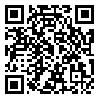Volume 1, Issue 2 (2021)
jpt 2021, 1(2): 89-100 |
Back to browse issues page
Download citation:
BibTeX | RIS | EndNote | Medlars | ProCite | Reference Manager | RefWorks
Send citation to:



BibTeX | RIS | EndNote | Medlars | ProCite | Reference Manager | RefWorks
Send citation to:
Ayatollahy H. Descartes' Philosophical Errors in Explaining Epistemological Errors. jpt 2021; 1 (2) :89-100
URL: http://jpt.modares.ac.ir/article-34-51129-en.html
URL: http://jpt.modares.ac.ir/article-34-51129-en.html
Philosophy Department, Faculty of Literature and Foreign Languages, University of Allameh Tabatabai, Tehran, Iran , ayatollahy@atu.ac.ir
Abstract: (4214 Views)
In philosophical explanation, Descartes knows the reason for our errors to be limited to the limits of our will and to rule our minds based on his free and unlimited will on matters that the perception has not clearly and distinctly understood. He intends to present some philosophical demonstrations for his explanations. In this paper, I introduce some of his errors in his demonstrations. The most important drawback is that Descartes' argument that will is unlimited, i.e., simplicity of will, can in some ways apply to unlimitedness of perceptions. And his argument for the limitation of perceptions because it belongs to objects of perceptions can also imply the objects of will, and as a result, the will is also limited. Another drawback is the inference of the infiniteness of the will because of its simplicity, whereas the pure actuality of will (or perceptions) results in it being immateriality, not its indefiniteness. Consequently, Descartes' explanation of the error and its origin does not seem to be justified in the difference between the scope of will and perceptions.
Article Type: Original Research |
Subject:
Metaphysics (Modern)
Received: 2021/03/27 | Accepted: 2021/06/7 | Published: 2021/10/16
Received: 2021/03/27 | Accepted: 2021/06/7 | Published: 2021/10/16
Send email to the article author
| Rights and permissions | |
 |
This work is licensed under a Creative Commons Attribution-NonCommercial 4.0 International License. |






